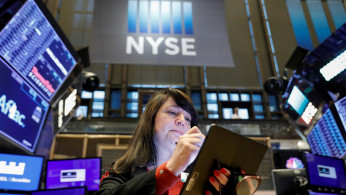Jerry Lin

The Latest
-
U.S. Retail Sales Rise 0.2% in February, Below Expectations as Growth Outlook Dims
Retail sales in the United States rose modestly in February, falling short of Wall Street expectations and reinforcing concerns that consumer spending may be slowing as economic uncertainty persists. The Commerce Department reported Monday that headline retail sales increased 0.2% for the month, below the 0.6% gain economists surveyed by Dow Jones had anticipated. 
Retail sales in the United States rose modestly in February, falling short of Wall Street expectations and reinforcing concerns that consumer spending may be slowing as economic uncertainty persists. The Commerce Department reported Monday that headline retail sales increased 0.2% for the month, below the 0.6% gain economists surveyed by Dow Jones had anticipated. -
Gold Prices Edge Toward $3,000 as Fed Meeting, Trade War Fears Drive Investor Demand
Gold prices climbed higher on Monday, continuing their rally after briefly breaching the $3,000 mark last week for the first time. Investor focus remains fixed on the upcoming U.S. Federal Reserve meeting and escalating global trade tensions that have fueled safe-haven demand. 
Gold prices climbed higher on Monday, continuing their rally after briefly breaching the $3,000 mark last week for the first time. Investor focus remains fixed on the upcoming U.S. Federal Reserve meeting and escalating global trade tensions that have fueled safe-haven demand. -
Oil Prices Rise as U.S. Intensifies Strikes on Houthis, China Data Boosts Demand Outlook
Oil prices advanced on Monday, supported by escalating geopolitical tensions in the Middle East and renewed optimism surrounding China's economic recovery. West Texas Intermediate (WTI) crude for May delivery rose 68 cents, or 1%, to settle at $67.59 a barrel on the New York Mercantile Exchange. May Brent crude, the international benchmark, climbed 72 cents, or 1%, to $71.30 a barrel on ICE Futures Europe. 
Oil prices advanced on Monday, supported by escalating geopolitical tensions in the Middle East and renewed optimism surrounding China's economic recovery. West Texas Intermediate (WTI) crude for May delivery rose 68 cents, or 1%, to settle at $67.59 a barrel on the New York Mercantile Exchange. May Brent crude, the international benchmark, climbed 72 cents, or 1%, to $71.30 a barrel on ICE Futures Europe. -
U.S. Wholesale Prices Flat in February, Easing Inflation Concerns Amid Tariff Tensions
Producer prices in the United States remained flat in February, offering some relief to inflation concerns just as President Donald Trump's administration moves forward with controversial tariffs on steel and aluminum imports. 
Producer prices in the United States remained flat in February, offering some relief to inflation concerns just as President Donald Trump's administration moves forward with controversial tariffs on steel and aluminum imports. -
U.S. Inflation Slows to 2.8% in February
The U.S. inflation rate cooled more than expected in February, rising 2.8% on an annual basis as consumer price increases showed signs of moderating, according to the Bureau of Labor Statistics. The consumer price index (CPI) increased 0.2% for the month, following a 0.5% rise in January. Core CPI, which excludes volatile food and energy costs, also rose 0.2% on the month and was up 3.1% from a year ago. 
The U.S. inflation rate cooled more than expected in February, rising 2.8% on an annual basis as consumer price increases showed signs of moderating, according to the Bureau of Labor Statistics. The consumer price index (CPI) increased 0.2% for the month, following a 0.5% rise in January. Core CPI, which excludes volatile food and energy costs, also rose 0.2% on the month and was up 3.1% from a year ago. -
Trump Imposes 25% Steel and Aluminum Tariffs as EU Retaliates With $28 Billion Countermeasures
President Donald Trump imposed sweeping 25% tariffs on steel and aluminum imports Wednesday, a move aimed at boosting U.S. manufacturing but one that has already drawn sharp retaliation from the European Union. The tariffs, which apply to all foreign producers, mark the administration's first broad-based tariff policy in Trump's second term, reversing exemptions granted to allies under his predecessor, Joe Biden. 
President Donald Trump imposed sweeping 25% tariffs on steel and aluminum imports Wednesday, a move aimed at boosting U.S. manufacturing but one that has already drawn sharp retaliation from the European Union. The tariffs, which apply to all foreign producers, mark the administration's first broad-based tariff policy in Trump's second term, reversing exemptions granted to allies under his predecessor, Joe Biden. -
U.S. Job Openings Rise to 7.74 Million, Defying Early Recession Fears
U.S. job openings rose to 7.74 million in January, a modest increase from December's revised figure of 7.51 million, signaling short-term labor market stability despite looming uncertainty over federal layoffs and economic slowdown fears sparked by the Trump administration's fiscal policies. 
U.S. job openings rose to 7.74 million in January, a modest increase from December's revised figure of 7.51 million, signaling short-term labor market stability despite looming uncertainty over federal layoffs and economic slowdown fears sparked by the Trump administration's fiscal policies. -
U.S. Tariff Chaos Stokes Recession Fears Across North America, Economists Warn
The risk of recession in the United States, Canada, and Mexico is growing as U.S. trade policy remains in flux, according to a survey of economists conducted this week. The Trump administration's abrupt implementation and subsequent suspension of 25% tariffs on imports from its North American neighbors have created widespread uncertainty, leaving businesses and financial markets struggling to predict the economic outlook. 
The risk of recession in the United States, Canada, and Mexico is growing as U.S. trade policy remains in flux, according to a survey of economists conducted this week. The Trump administration's abrupt implementation and subsequent suspension of 25% tariffs on imports from its North American neighbors have created widespread uncertainty, leaving businesses and financial markets struggling to predict the economic outlook. -
Job Growth Slows to 151,000 in February, Unemployment Rises to 4.1%
The U.S. economy added 151,000 jobs in February, falling short of economists' expectations as the unemployment rate edged up to 4.1%, according to data released Friday by the Bureau of Labor Statistics. The job gains were higher than January's revised figure of 125,000 but below the 170,000 projected by analysts. 
The U.S. economy added 151,000 jobs in February, falling short of economists' expectations as the unemployment rate edged up to 4.1%, according to data released Friday by the Bureau of Labor Statistics. The job gains were higher than January's revised figure of 125,000 but below the 170,000 projected by analysts. -
Wall Street Rebounds as Jobs Report Fuels Rate Cut Bets as Global Markets Struggle
U.S. stock futures rose on Friday as a weaker-than-expected jobs report strengthened investor expectations that the Federal Reserve will cut interest rates later this year. Futures for the S&P 500 gained 0.3%, while the Dow Jones Industrial Average rose 0.2%. Nasdaq futures climbed 0.4%, rebounding from a sharp selloff earlier in the week that pushed the tech-heavy index into correction territory. 
U.S. stock futures rose on Friday as a weaker-than-expected jobs report strengthened investor expectations that the Federal Reserve will cut interest rates later this year. Futures for the S&P 500 gained 0.3%, while the Dow Jones Industrial Average rose 0.2%. Nasdaq futures climbed 0.4%, rebounding from a sharp selloff earlier in the week that pushed the tech-heavy index into correction territory.